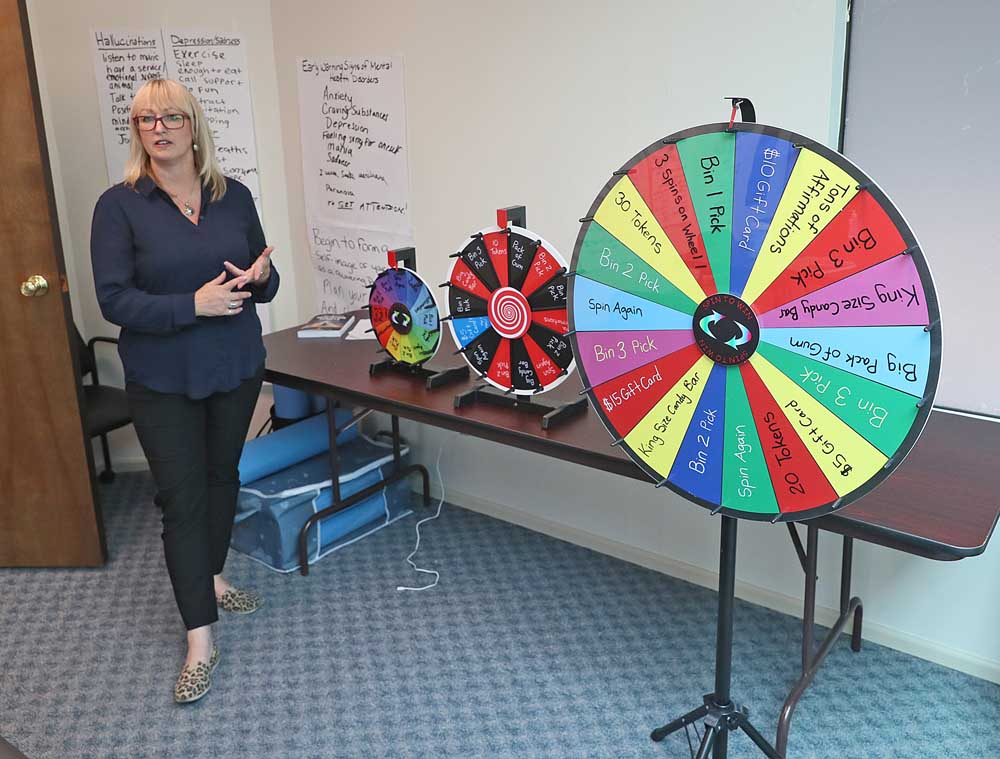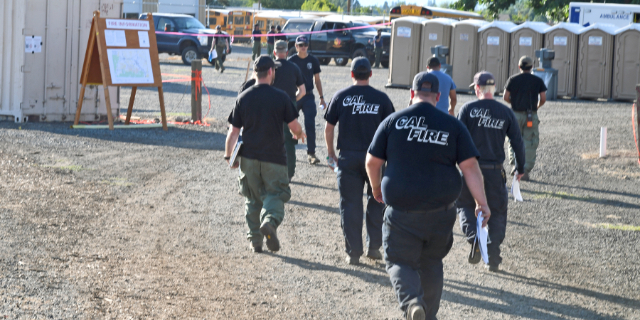New treatment program takes on Jackson County’s most urgent behavioral health cases
Published 12:30 pm Tuesday, August 8, 2023

- Taji Allen, OnTrack's new integrated behavioral health clinic director, says participants in Recovery360 spin a reward wheel to help build success in the program.
A new behavioral health treatment program in Medford has taken on the people most in need of help and often least likely to get it.
Trending
Recovery360, quietly launched by OnTrack Rogue Valley and Jackson County Mental Health in June, is for individuals whose mental illness and drug-and-alcohol addiction are so extreme that they struggle to thrive in traditional treatment programs. Few mental health counselors address substance use disorder, and substance use disorder counselors aren’t trained to handle people who are actively psychotic.
The program’s participants are the most difficult to get off the streets and into regular shelters, said Sommer Wolcott, executive director of OnTrack, an addiction-treatment provider.
“They’re too symptomatic and too disruptive in those kind of environments,” she said.
Trending
These are the people who get arrested for public indecency, disorderly conduct, property destruction, assault and sometimes worse. When it is time to adjudicate their charges, many are found unable to aid and assist in their own defense, ordered to receive mental health treatment and sent to Oregon State Hospital in Salem. They are eventually discharged back into homelessness, fall off their medications, slip into psychosis, start using substances again and commit more crimes.
“They’re stuck in this cycle where they’re going from the jail to the hospital to the streets, over and over again,” Wolcott said.
They’re also stuck in a legal status where their crimes can’t be resolved and charges continue to mount, while failure-to-appears roll into warrants. In Jackson County, at least 50 people are under aid-and-assist orders at any given time, according to Taji Allen, OnTrack’s new integrated behavioral health clinic director. Until recently, Allen was the program manager for forensic and court-involved treatment programs at Jackson County Mental Health.
“Those folks don’t really need to go to Oregon State Hospital. They need to have an opportunity to get stable where they live,” Allen said.
Recovery360 is a structured day treatment program of about 35 hours a week. Wraparound services, including medication from Paradigm Mental Health and Wellness, are delivered on site. Case managers, therapists, mental health and addiction counselors, and recovery peers work with participants throughout the week.
In early August, the program had seven participants — four men and three women — ranging in age from early 20s to late 50s. Some tend to be quiet and withdrawn, others more animated and talkative, Wolcott said.
“What’s the same is that they have all really struggled and recognize that each other has struggled to overcome a lot of barriers,” she said.
And, unlike with their prior treatment experiences, the participants don’t feel they stand out as having special challenges.
In the morning, staff from OnTrack and Jackson County Mental Health drive to the participants and pick them up. One lives at Rogue Retreat’s Kelly Shelter, another at Rogue Retreat Crossings. Others live at the Jackson County Community Justice Transition Center. One remains unsheltered. A long-term goal is to provide supportive housing, but that’s a ways off, Wolcott said.
Staff take them to OnTrack, where breakfast — usually oatmeal, fruit and coffee — awaits the participants. They later enjoy lunch across the street at Compass House, a clubhouse designed to help people with mental illness reintegrate into the community.
During the week, they participate in lifeskill activities — learning how to make a dentist appointment and get their food stamps renewed, for example. These happen in groups and in one-on-one meetings.
Physical activity has consisted of ’80s workouts and heading to Alba Park nearby for stretching and yoga. Participants go for walks and field trips. One time Compass House took them on a hike at Roxy Ann Peak. They learn about mindfulness and undertake art projects; this week they will paint and personalize mugs.
Much time is spent working through booklets in the group room. Participants ask questions and process their emotions. The goal is to help them build insight into what led them to use substances and learn how to think about doing something else.
OnTrack also has a relaxation room with nature sounds, a water fountain and natural light filtered through a cloth-covered skylight. People can go there to wind down, escape the stimulation, have space to themselves.
Small steps are considered big wins — such as when a participant who is normally silent strikes up a conversation, or says what they like about the others.
“It really is incremental, positive progress that is celebrated in the moment,” Allen said.
Recovery360 reinforces good behavior in two ways.
The program has a token economy. If participants do basic things — arrive on time, stay all day, join activities, etc. — they get vouchers, called “Recovery360 cash,” to purchase items at OnTrack’s store, from makeup to hygiene products, hats and socks to water bottles, phone cards and art supplies.
The other depends on urinary analysis results. A clean test result allows them to spin a reward wheel for prizes such as tokens, small candy bars and affirmations from their cohort. Repeated negative results earn additional spins; participants move on to bigger wheels with bigger prizes such as king-size candy bars and gift cards. A positive UA means they have to start over.
“The participation rate is really high,” Wolcott said. “There’s been a few days that people have missed here and there, but this is a program that operates five days a week from 9 a.m. to 4 p.m., so it is going really well.”
Wolcott estimates that most participants will be in the program at least six months.
Once OnTrack is confident they can manage their symptoms and stay off substances, participants will move into traditional outpatient services. They’ll attend day treatment on fewer days, but those days will ramp up if they start to destabilize.
Wolcott first pitched the idea of a day treatment center to Jackson County Mental Health a little over a year ago.
“The unmet need was so clear,” she said. “There’s nowhere for these folks to go.”
But there was nothing in Oregon for OnTrack to look to as a model.
The state did not have an Oregon Health Authority-approved day-treatment level of care — also known as a partial hospitalization — that falls between residential treatment and intensive outpatient treatment.
“We went through the process of building it kind of regardless,” she said.
When Oregon submitted its 2022-27 Medicaid 1115 Waiver Application — which allows the state to ask the federal government for permission to broaden how it spends its Medicaid dollars — the feds required the state to expand its continuum of care to include all levels of need.
A program with partial hospitalization then became possible. “So we were able to move forward,” Wolcott said.
Right now, the program is largely paid for by Jackson County Mental Health. Medical billing will ultimately sustain the program, she said.
The majority of participants will have insurance through Jackson Care Connect and AllCare Health, the Rogue Valley’s two coordinated care organizations.









